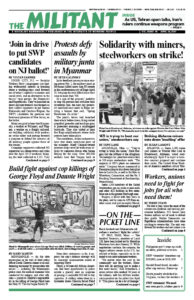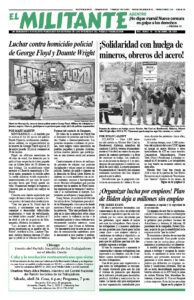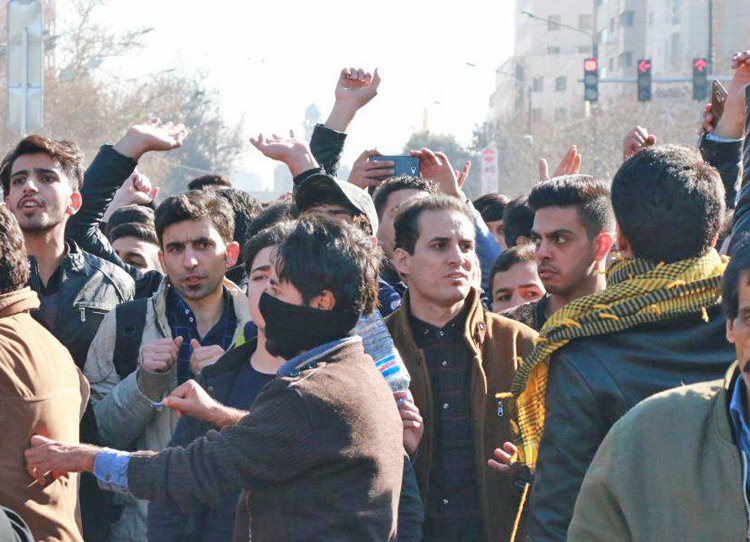An explosion that disabled parts of the Iranian rulers’ main nuclear facility at Natanz April 11 was blamed on Israeli government forces by Tehran. Most media in Israel attributed the attack to Mossad, the Israeli rulers’ spy agency.
Less than a week before, indirect talks began between Washington, Tehran and other governments, seeking to revive the 2015 nuclear deal that aimed to limit the Iranian rulers’ acquisition of nuclear weapons in exchange for an end to sanctions.
The talks are unfolding as Tehran, Washington and other capitalist powers are jockeying to strengthen their economic and political interests in the region.
Former President Donald Trump pulled Washington out of that deal in 2018, citing Tehran’s intervention in Lebanon, Syria, Iraq and Yemen and its continuing ballistic missile program. On April 6 talks began between delegations from Washington and Tehran along with representatives from France, Germany and the U.K., as well as European Union officials.
State Department officials said April 7 that Washington would consider lifting an unspecified number of sanctions it imposes on Iran that have crippled the Iranian rulers’ trade and fall hardest on working people.
Tehran, backed by both Moscow and Beijing, demands all the sanctions go. While it continues to claim its nuclear program is for peaceful purposes, the Iranian government had abandoned compliance with the 2015 pact by openly enriching uranium to 20% purity. After the attack, Tehran announced April 13 that it would now begin enriching uranium to 60%, closer to bomb-grade, and activate 1,000 advanced centrifuge machines at the underground Natanz plant.
The regime in Iran calls for the destruction of Israel.
As the talks between Washington and Tehran began, Israeli Prime Minister Benjamin Netanyahu spoke out against reviving the 2015 pact. He said his government would “never allow Iran to obtain the nuclear capability to carry out its genocidal goal of eliminating Israel.”
He pledged to continue to take action against Tehran’s deployment of militias and missiles across the region. The Iranian rulers have entrenched their forces in Syria, Iraq, Lebanon and elsewhere, in order to expand their clout against rival Arab rulers and also to target Israel.
Iranian officials called the April 11 attack an act of “nuclear terrorism” and Foreign Minister Javad Zarif vowed revenge. The White House quickly denied any involvement.
The attack is the latest in a series of clashes between the Israeli rulers and Tehran, including an explosion in Natanz last July; the assassination of Iran’s top nuclear scientist in November; attacks on Iranian and Israeli ships in the Gulf region; a missile and drone strike on Saudi oil facilities in 2019 by Tehran; and repeated airstrikes by the Israeli military against Tehran-backed militia and missile bases in Syria.
Iran’s rulers target working people
Iranian workers and farmers made a deep-going popular revolution in 1979, overthrowing the U.S.-backed rule of the shah. Over years, capitalist forces led by Shiite clerics stifled that revolution and pushed working people out of politics.
They launched a counterrevolutionary expansionist course that has brought them into greater conflict with working people across the region. Tehran-backed militias brutally defended the Bashar al-Assad regime in Syria after an uprising against his rule. They aided the Iraqi government’s bloody repression of protests for jobs and political rights in 2019.
In Iran itself working people took to the streets at the end of the same year to protest the financial and human costs of the regime’s wars and its refusal to meet the needs of the population.
“Rival ruling classes throughout the region know that, despite the 2015 agreement, Tehran is close to being able to produce nuclear weapons and delivery systems. Such arms, however, would provide no defense for Iran against military threats from U.S. imperialism and other nuclear powers, nor any relief from the inhumane and unconscionable sanctions Washington and other imperialist governments have imposed on the Iranian people,” Socialist Workers Party leader Steve Clark wrote in the Militant article “Revolution, Counterrevolution and War in Iran” in April 2018. “To the contrary, weapons of mass destruction would merely provide a rationalization for the Saudi Arabian and other regimes in the region to enter the nuclear arms race, as well as for the Israeli government to maintain and bolster its existing nuclear arsenal.
“The Socialist Workers Party demands Washington’s immediate unilateral nuclear disarmament. We call on the eight other regimes in the world that currently have these catastrophic weapons to get rid of them, and we oppose their development and deployment by any government.”


